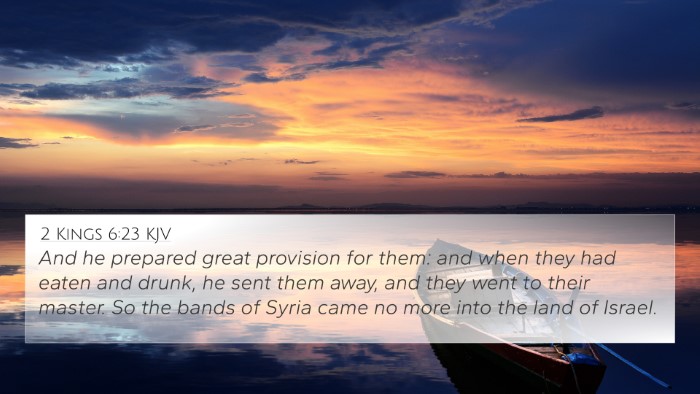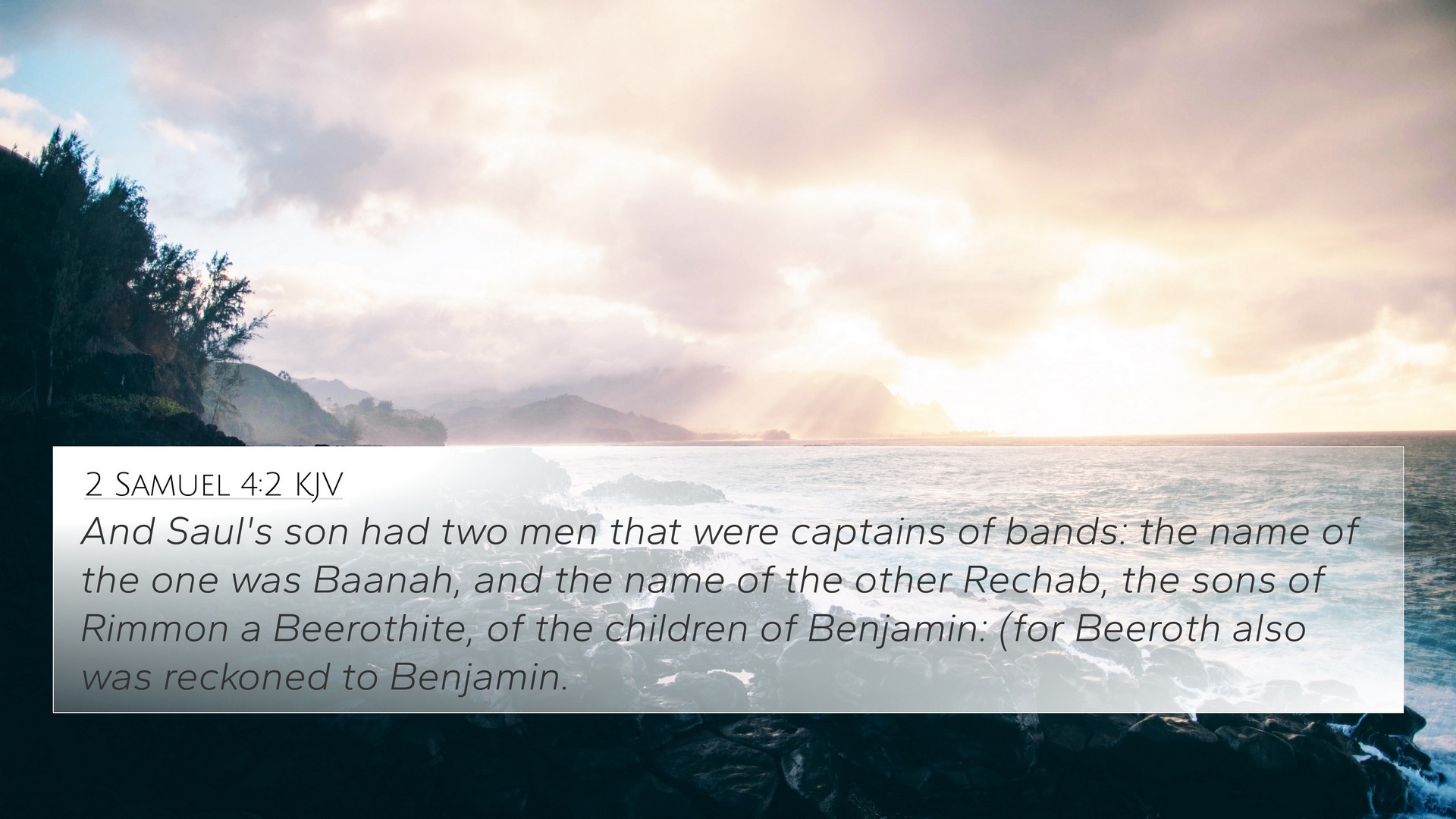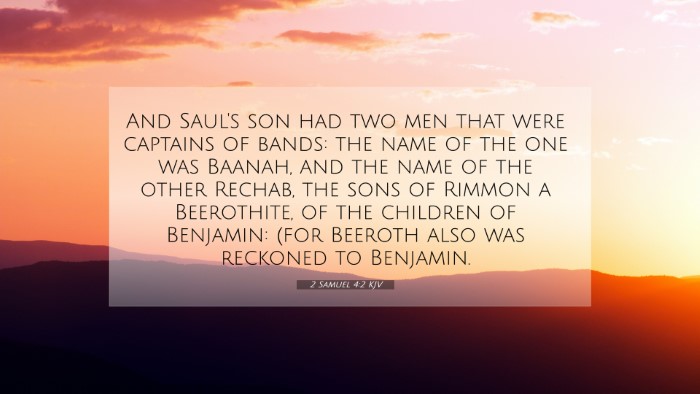Old Testament
Genesis Exodus Leviticus Numbers Deuteronomy Joshua Judges Ruth 1 Samuel 2 Samuel 1 Kings 2 Kings 1 Chronicles 2 Chronicles Ezra Nehemiah Esther Job Psalms Proverbs Ecclesiastes Song of Solomon Isaiah Jeremiah Lamentations Ezekiel Daniel Hosea Joel Amos Obadiah Jonah Micah Nahum Habakkuk Zephaniah Haggai Zechariah Malachi2 Samuel 4:2 Similar Verses
2 Samuel 4:2 Cross References
And Saul's son had two men that were captains of bands: the name of the one was Baanah, and the name of the other Rechab, the sons of Rimmon a Beerothite, of the children of Benjamin: (for Beeroth also was reckoned to Benjamin.
Uncover the Rich Themes and Topics of This Bible Verse
Listed below are the Bible themes associated with 2 Samuel 4:2. We invite you to explore each theme to gain deeper insights into the Scriptures.
2 Samuel 4:2 Cross Reference Verses
This section features a detailed cross-reference designed to enrich your understanding of the Scriptures. Below, you will find carefully selected verses that echo the themes and teachings related to 2 Samuel 4:2 KJV. Click on any image to explore detailed analyses of related Bible verses and uncover deeper theological insights.

Joshua 9:17 (KJV) »
And the children of Israel journeyed, and came unto their cities on the third day. Now their cities were Gibeon, and Chephirah, and Beeroth, and Kirjathjearim.

2 Samuel 3:22 (KJV) »
And, behold, the servants of David and Joab came from pursuing a troop, and brought in a great spoil with them: but Abner was not with David in Hebron; for he had sent him away, and he was gone in peace.

2 Kings 6:23 (KJV) »
And he prepared great provision for them: and when they had eaten and drunk, he sent them away, and they went to their master. So the bands of Syria came no more into the land of Israel.

2 Kings 5:2 (KJV) »
And the Syrians had gone out by companies, and had brought away captive out of the land of Israel a little maid; and she waited on Naaman's wife.
2 Samuel 4:2 Verse Analysis and Similar Verses
Understanding 2 Samuel 4:2
Verse: 2 Samuel 4:2 states, "And Saul's son had two men that were captains of bands: the name of the one was Baanah, and the name of the other Rechab, the sons of Rimmon a Beerothite, of the children of Benjamin: for Beeroth also was reckoned to Benjamin." This verse sets the stage for significant unfolding events in the narrative of King David's rise to power.
Summary and Insights
This verse introduces key figures in the Biblical narrative—Baanah and Rechab—who play pivotal roles in subsequent events surrounding the downfall of Saul's dynasty. Understanding their backgrounds and motivations can provide deeper insights into the socio-political dynamics of Israel during this period.
Commentary Insights
-
Matthew Henry's Commentary:
Henry emphasizes the significance of the two captains, Baanah and Rechab, highlighting their lineage as sons of Rimmon, with roots in Benjamin. He notes their roles would not just be as military leaders but also possibly as agents influencing the political landscape as the narrative unfolds.
-
Albert Barnes' Commentary:
Barnes offers insight into the implications of their identity as captains, suggesting that their allegiances could shift. He points to the importance of understanding their motivations, alluding to possible ambitions that could lead to treachery or loyalty during the power struggle after Saul's death.
-
Adam Clarke's Commentary:
Clarke discusses the geographical and tribal context of Beeroth, connecting it to the tribe of Benjamin. He suggests that the focus on their place of origin indicates the complexities of tribal loyalties that existed in Israel, which would eventually play a role in the national conflict.
Cross-References
To deepen understanding, several cross-references emerge that highlight the connections between this passage and broader themes within Scripture:
- 1 Samuel 9:1-2: Discusses Saul's lineage and the significance of the tribe of Benjamin.
- 2 Samuel 2:8-10: Details the rise of Ishbosheth, Saul's son, and the challenges faced by his supporters.
- 2 Samuel 4:5-7: Describes the assassins’ actions against Ishbosheth—an event rooted in this verse’s context.
- 1 Chronicles 8:12: Mentions the descendants of Benjamin, emphasizing the ancestral ties relevant to Baanah and Rechab.
- 2 Samuel 1:10: Highlights the treachery in relation to David's rise, foreshadowed by the captains introduced here.
- 2 Samuel 3:17-18: Illustrates the political maneuvering among the tribes during David's ascension.
- 1 Samuel 10:1: Connects Saul’s anointing to the larger narrative influencing the events described in 2 Samuel.
Thematic Connections
Several significant themes arise from 2 Samuel 4:2 that resonate throughout the Scriptures:
- Leadership and Loyalty
- Political Intrigue and Conflict
- Tribal Allegiance and Identity
- The Role of Ambition and Treachery
- Divine Sovereignty in Historical Context
Application for Study
This verse serves as a foundation for understanding the tumultuous transition of power in Israel, encapsulating the dynamics of leadership, loyalty, and betrayal. Here are some tools and approaches for deeper study:
- How to use Bible cross-references: Identify related verses that highlight themes of loyalty and betrayal.
- Bible concordance: Use a concordance to find passages addressing leadership and conflict.
- Bible cross-reference guide: Leverage cross-reference guides to study parallels with New Testament teachings.
- Cross-referencing Bible study: Engage in studies that draw thematic links, such as between kings in the Old Testament and Jesus's leadership in the New Testament.
Conclusion
2 Samuel 4:2 contains layers of meaning that contribute to the overall narrative of Scripture. By examining the motivations and identities of Baanah and Rechab within their historical context, believers can appreciate the complexities of God's plan and the unfolding story of Israel's history.



